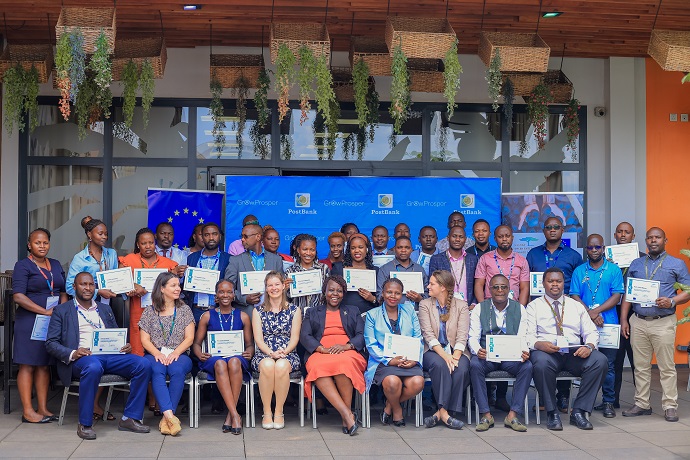By Solomon Lubambula
PostBank Uganda, in partnership with adelphi under the EU-funded Uganda Green Enterprise Finance Accelerator (UGEFA), has trained 30 staff through its Green Finance Academy to boost green finance knowledge and advance global sustainability goals by 2030.
The capacity-building program equips employees with insights into global best practices, aiming to accelerate understanding of green finance within Uganda’s financial sector.
Carolyn Andama, PostBank’s Head of Public Sector, said the training will enhance the delivery of finance to bankable green SMEs, scaling positive environmental, social, and economic impacts.
She applauded the Uganda Green Enterprise Finance Accelerator for championing sustainable initiatives tailored to the financial sector, ensuring that green loans are disbursed to sustainable businesses, promoting growth, and driving development.
She noted the significance of such training to PostBank Uganda, saying that banks play a critical role in financing projects that drive long-term sustainability.

“As you’re all aware, we extend loans and grants to customers, and it’s only right that these loans are extended and applied sustainably for a greater future. So financial institutions avail these capital and financial instruments which can influence industries by funding sustainable initiatives, driving decarbonisation, addressing social challenges like poverty or inequality, which lay a foundation to global sustainable development goals, which is a great part of the 2030 SDGs”-Andama
The training sessions included Defining the Green Finance context, Understanding green SMEs, Mapping Green Finance Instrument, Assessing Climate Risk & Opportunities, Portfolio & Target Market Analysis.
Andama says these sessions were designed to deepen the team’s understanding of green finance, the banking sector’s role in sustainability, and related growth opportunities.
Christine Meyer, Project Lead at UGEFA, applauded PostBank Uganda for prioritizing staff training aligned with the global sustainability agenda.
She said the initiative would boost the flow of green finance into Uganda’s SME sector, adding: “Making affordable loan facilities available to small and medium-scale enterprises will go a long way in helping them navigate climate risks and seize green finance opportunities.”
“So jointly with Postbank and other financial institutions, we provide blended loans with ticket sizes between 36 million and 370 million Ugandan shillings. And these tickets are provided to up to 240 green SMEs that can benefit from those products. With this, we are trying to close the missing middle finance gap.
So we know that green SMEs, in order to scale their operations and their green impacts, need access to finance, which is currently difficult for them to obtain due to high risks that banks perceive when they invest in green SMEs, due to the collateral requirements, and sometimes also high interest rates and costs that come with debt finance. So we are trying to close this gap by blending commercial loans with grant funding,” Meyer explained.
Dorothy Babuleka, Credit Manager at Soroti PostBank Branch, expressed optimism that following this training, bank officers will actively engage with and advise communities on green loans. She noted that this approach will not only strengthen the bank’s loan portfolio but also positively influence the social and economic well-being of the people.
“We will support SMEs and ventures such as solar villages and schools seeking affordable energy solutions like solar biodigesters. By sharing this knowledge with communities, we will extend more loans, grow our portfolio, and attract additional deposits from potential clients,” Babuleka said.


